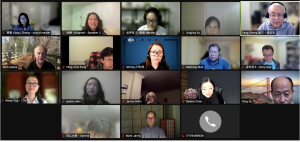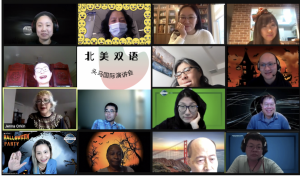– on the English-Mandarin Bilingual Toastmasters Club
By: Fang Sheng Edited by: Ben Murphy

Many professionals need to speak in public from time to time, and the challenges of addressing a crowd are particularly acute when one has to speak a non-native tongue. This is true for many immigrants whose work involves public speaking in various capacities. Often one will wonder, “What if there’s a place where I can hone my speaking skills, particularly in my second language?”
Cue the North America Chinese Bilingual Toastmasters Club – a newly established bilingual club under Toastmasters International, a US-headquartered non-profit international educational organization with the purpose of promoting communication, public speaking, and leadership.
The idea was first proposed at the ATA-CLD Christmas party in December 2020. Jiayin (Jenny) Zheng, who had very positive prior experiences at Toastmasters Club, thought it would be a good way of keeping bilingual proficiency. The idea was met with enthusiastic response. Soon afterward, on January 27, 2021, the North America Chinese Bilingual Toastmasters Club (NACB) was founded.
The NACB is unique in that it is among the few English-Mandarin bilingual Toastmasters Clubs; others include the Vancouver Mandarin Learners Toastmasters Club and the Silicon Valley Advanced Mandarin Toastmasters Club. There are clubs of other bilingual combinations, but NACB is the only English-Mandarin combination in District 38, covering eastern Pennsylvania and southern and central New Jersey, with 3,000 members in 150 clubs.
A Toastmasters Club session consists of three basic parts: prepared speeches, impromptu speeches, and evaluations and reports. Each meeting has a theme proposed and agreed upon by club members. NACB meetings include themes such as《新年计划,总成笑话》 (New Year Plans, Jokes They Stand – in Mandarin), or Oh, the Places You Will Go, based on a book by Dr. Seuss (in English). The prepared speeches need not be based on the theme. Instead, they follow the Pathway Curriculum, a Toastmasters’ education program designed to help build communication and leadership skills. It consists of 11 paths that teach more than 300 unique competencies, from Dynamic Leadership to Team Collaboration to Persuasive Influence.
Each speech evaluation has its specific form, which is emailed back to the speaker for recordkeeping. The evaluator also gives an oral evaluation at the meeting (2-3 minutes). At NACB, there is also a group evaluation function, called the Round Robin evaluation, where everyone can provide feedback. While the individual evaluation is standard, the group evaluation is adapted from more advanced clubs.
Other feedback methods include the grammarian report, “Ah-Counter” report, timer report, and the general evaluator report, which provide feedback for all participants. Most of the time these roles are filled by club members. But often guests or prospective members are invited to try out some of these functionary roles for an in-depth experience. In the two sessions I participated in as a guest, I acted as the Ah-Counter and Grammarian. The Ah-Counter is a particularly interesting role. It calls for taking note of all the “ahs” and “uhs” as well as other filler words used by each speaker. It sounds like a fun and easy gig, but it turns out to be much more serious and requires a great deal of focus, so you don’t miss any instances and keep track of who has said what. Then you have to report back to the session, a speech that itself is timed as well! The grammarian is charged with picking out “mistakes” from the speeches, including grammatical errors and misuse of words and phrases. You can be extremely strict or quite lenient, depending on what you consider to be “wrong”. In this role, as in other evaluator roles, one learns how to provide feedback constructively with professionalism and sincerity.
The NACB sessions alternate between English and Mandarin every two weeks. In the sessions I’ve personally participated in, I’ve observed that there are non-native speakers of either language: almost all of the English speakers are non-native, while a number of non-native speakers of Chinese also present admirable Chinese speeches.
The participants come from diverse backgrounds. Some are professional translators or interpreters, such as Jianyin (Jenny) Zheng, a court interpreter, translator and localizer, or Yongmei Li, the inaugural and current president of NACB, or Nanme Zheng, NACB’s current secretary, a freelance interpreter in the fields of medical, legal, and community interpreting. Or Ping Xu, a real estate agent, lawyer, and court interpreter, participates enthusiastically in every meeting and often acts as Ah-counter, Word Master, Timer, or other roles, with diligent dedication. Members of NACB come from a variety of geographical areas, from Dallas to Philadelphia to Delaware, to Vancouver or Toronto, Canada.

Members and guests appreciate the learning opportunity that NACB Toastmasters Club affords them, as evidenced by the experiences shared by some members:
“I personally have made a lot of new friends through the Toastmasters program, gained leadership skills and confidence in public speaking, and improved in specific areas of public speaking, such as speech structure, vocal variety, and the use of body language. It has been a very empowering experience.”
Yongmei Li, NACB President, ATA Member
“I have become much better at not using filler words, and now my interpretation at depositions is more fluid.”
Tianlu Redmon, former NACB member, ATA Chinese Language Division Administrator, Court Interpreter
“NACB Toastmasters helps me gain confidence in public speaking. I want eventually to be able not just to interpret but to speak in front of a large group of people with ease.”
Jianyin (Jenny) Zheng, ATA Member, Court Interpreter, Translator
“Even though I may be a stay-at-home mom, my schedule is just as packed as if I was working full-time, if not more so. The Pathways Education Program provided by Toastmasters International really helps make it easier for me to keep track of my progress in developing and enhancing the set of skills that I want to work on. There are so many options to choose from, and I can choose to work on them at any pace I would like. And, since my Pathways progress is monitored by the officers of my club, I feel like I have free accountability partners to help keep me on track towards my goals.”
Nanme Zheng, NACB Secretary, Member of ATA and DVTA
“Doing is the way to get better.”
Ping Xu, Real Estate Agent, Lawyer, Court Interpreter
As a current member of the NACB club, I was so happy to meet like-minded people who share the same passion in public speaking and who are extremely motivated (and therefore motivating).
If anyone is interested in joining the club or visiting our meeting as a guest, here are two ways to get in touch:
1) send an email to tmnorthamericachinesebilingual@gmail.com
2) go to https://nacb.toastmastersclubs.org/ and use the “contact us” button to introduce yourself!